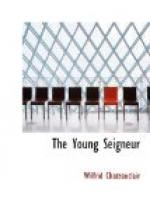FIAT JUSTITIA
“I wonder at you!—I wonder at you!” exclaimed Chrysler, pacing the drawing-room of the Manor-house, to his friend, “What will be the result of it?”
“Cher Monsieur,” Haviland replied. “I have done my duty and what have I to do with events? What is Dormilliere county and a year or two of the consequences of this election? I do not live in them or of them.”
The face of the far-seeing god himself, whose statue stood once more near, could scarcely show less regret than the easy, indomitable countenance of Chamilly; yet that his nerves had been strained to a severe pitch, lines of exhaustion upon it clearly told, and his restless, reckless movements from one spot and position to another made his friend anxious. A raw wind storm had risen quickly from the east and whistled without. He advanced to the window and threw both its curtains wide apart, revealing under an obscured snatch of struggling moonlight, the heavens covered with rapid-moving clouds, and the poplars opposite bending their vague shapes beneath the wind,—the beginning of one of those storms which come up from the Gulf, and overrun the whole region for days.
“I should like to be on the River now,” he remarked exultingly. Madame entered at the moment and heard him.
“Be quiet, Chamilly,” chided the Seigneuresse.
“Alors, Alors,” he said impatiently, as if casting about for something active to do, and left the room.
“Madame de Bois-Hebert,” Chrysler said, “have you news from Mademoiselle Josephte?”
“That young person,” replied she, “has descended to the plane of her condition: I have no further interest in her.”
But the devout lady sighed.
The Gulf storm lowered steadily and disagreeably all next day and the visitor saw nothing of Chamilly, who kept in his room until the evening. But there was one excitement which occupied everyone else’s attention:
“Who do you think struck Francois?” Chrysler said to Zotique at the Circuit Court House.
“The Bonhomme has tracked Spoon through every bush and bay on the coast, and has caught him getting aboard the steamboat at Petite Argentenaye,” the Registrar replied.
A crowd came down the road. All the crowd were excited. They ran about a long waggon in which were on the first seat, the Honorable and Bonhomme; on the second a constable and prisoner handcuffed. Spoon, who cowered like a captured wild beast ready to whine with fright, was clapped into a private room and a stray Bleu flew off for Libergent to act as advocate. The crowd, soon uncomfortably larger, diverted itself by taking oratorical views of his guilt or innocence: but the prevailing opinion of the prisoner personally was expressed by one in an unfastidious proverb: “Grosse crache, grosse canaille.”
Libergent, accompanied by De Bleury, came over at once, for he had a good deal at stake in seeing that Spoon’s trial should lead to no unpleasant revelations or consequences to the party. Closeted not more than half an hour he came out and said publicly to l’Honorable, who took seat as Magistrate upon the Bench under the great lion-and-unicorn painting. “My client makes option of opening the investigation at once. He is not guilty of the charge and can clear himself.”




